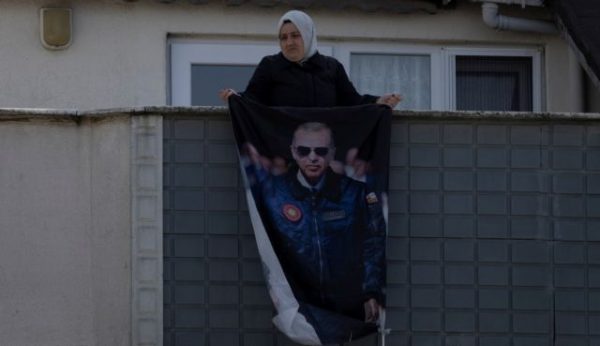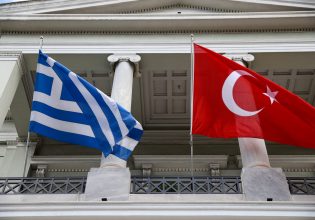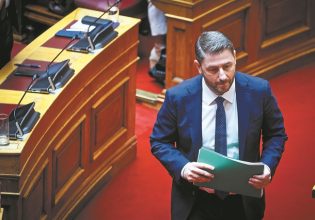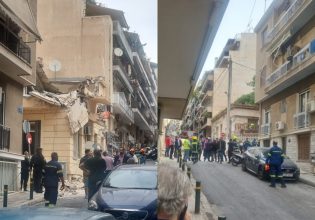Touloupaki under fire from politicians, judges over handling of Novartis case
...
Corruption Prosecutor Eleni Touloupaki is bearing a heavy weight on her shoulders of late, due to her handling of the Novartis kickbacks scandal.
In a lawsuit filed by former prime minister Antonis Samaras, Touloupaki, Prime Minister Alexis Tsipras, and Alternate Justice Minister Dimitris Papangelopoulos have all been accused of abuse of power and of establishing a criminal organisation.
Judge Touloupaki’s handling of the part of the case involving allegations against politicians has been disputed by those politicians who were implicated, by opposition parties, and even by Greece’s Association of Judges and Prosecutors.
When the presumption of objectivity and independence and of professional competence have been lost, how can the Corruption Prosecutor continue her task?
The Novartis case has hugely burdened political life. On 12 February, PM Tsipras delivered an inflammatory – and possibly electoral – speech to the Syriza parliamentary group.
“Today, the vulgarity of the declaration that ‘We all consumed public funds together’ is over. We did not ‘consume the money’ together. We are not all alike,” the PM declared.
Tsipras went on to speak of “dedication to the constitution”, and dismissed “witch hunts and popular courts”. He condemned the “old political system” as responsible for Greece’s tragic bankruptcy.
“Certain people are shameless, and they do not hesitate to shout that there is no scandal. Who are they? They are the ones who are truly hiding behind hoods. Now that the justice system threatens to remove their hoods and reveal them, they are charging that the witnesses are hiding behind hoods,” Tsipras said.
The same day, the government tabled its proposal for a preliminary criminal probe of implicated politicians in parliament, without particular individuals being charged of specific crimes.
Parliament is essentially being asked to decide that the crime of breach of trust on the part of the ten implicated politicians no longer stands due to the statute of limitations, and that the same should apply to Syriza minister Panagiotis Kouroumplis. It must also decide whether parliament is competent to file the related charges, or whether the case should be sent back to the judiciary.
At a news conference called by New Democracy, MP Makis Voridis, New Democracy shadow justice minister Nikos Panagiotopoulos, and New Democracy spokesperson Maria Spyraki, raised the following question: “What is parliament? Is it a research institute? If the crimes can no longer be prosecuted due to the brief statute of limitations, why has a proposal for a preliminary criminal investigation in parliament been tabled?”
Tool of annihilation
On 15 February, New Democracy leader Kyriakos Mitsotakis convened his parliamentary group in order to express his deep concern over Greek-Turkish relations. Yet, he also addressed the Novartis affair.
He said that the scandal is “not being handled by the independent justice system, as it has been snatched from the hands of the judiciary by the government, in order to use it as a tool to annihilate its political opponents.”
Mitsotakis said that the charges are unsubstantiated and that for this reason the government wants to rapidly wind up the preliminary criminal probe and send the case back to the judiciary.
He said that the allegations against politicians were manufactured, and demanded that the protected witnesses who testified against politicians be summoned to parliament to be cross examined, even if they keep their “hoods” on.
Mitsotakis warned the PM not to “dare to close the preliminary criminal probe before everything comes to light”.
Until recently, Judge Touloupaki appeared certain about her investigation and maintained that all proper legal procedures had been followed.
Competent judicial authorities, however, have said that there is no supplementary evidence against politicians, beyond the testimony of protected witnesses, as the judicial probe of politicians has not begun. It should be noted that when the name of a politician pops up in a judicial investigation, the file must be sent to parliament immediately.
In that case, major jurisprudential and political issues arise. How can one have placed in a witness protection programme three individuals who offered no specific evidence, emails, or bank accounts, but instead only offered rumours, speculation, and personal evaluations? Can it be that certain witnesses have testified both with their real names and as protected witnesses, a fact that would put the whole process in question, and all the more so if the witnesses themselves are implicated in the Novartis affair?
Was the necessary approval granted by the deputy Supreme Court Prosecutor for placing witnesses under protection?
Why was the file not sent to parliament poste haste, as the law requires, when the first mention of a politician popped up on 6 November, 2017?
Instead, Judge Touloupakis accepted testimony in instalments, (the protected witness with the pseudonym Ekaterini Kelesi testified nine times), regarding nine more politicians, up until 4 February, the day of the massive FYROM naming rally in Athens.
Why did Judge Touloupaki, even as depositions were continuing and all implicated individuals had not been named, request permission from the FBI to use evidenced from its probe regarding the ten politicians, even though there was no such evidence in the FBI file?
Why did government spokesman Dimitris Tzanakopoulos visit the Supreme Court shortly before the Novartis file was sent to parliament.
Why did Justice Minister Stavros Kontonis and Alternate Justicde Minister Dimitris Papangelopoulos know the content of the file, as demonstrated by their statements outside the PM’s office? Where did Alternate Health Minister Pavlos Polakis learn about the identities [professional capacity as ex-Novartis employees] of the protected witnesses?
Questions about testimony
The testimony itself raises a plethora of questions. The witnesses testified between three and five hours and yet the transcripts were only two or three A4 size printed pages, even though the law does not provide for summaries of testimony. The prosecutors pose extremely few questions, and those few appear designed to direct the witness, and not to illuminate events and seek evidence.
in.gr
Ακολουθήστε το in.gr στο Google News και μάθετε πρώτοι όλες τις ειδήσεις









































 Αριθμός Πιστοποίησης Μ.Η.Τ.232442
Αριθμός Πιστοποίησης Μ.Η.Τ.232442